[ted演讲 004] why thinking you're ugly is bad for you
TED演讲:是什么让你与众不同
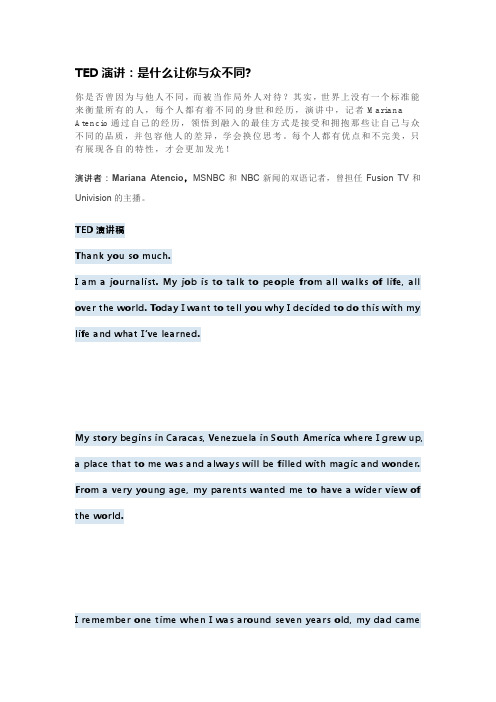
TED演讲:是什么让你与众不同?你是否曾因为与他人不同,而被当作局外人对待?其实,世界上没有一个标准能来衡量所有的人,每个人都有着不同的身世和经历,演讲中,记者Mariana Atencio通过自己的经历,领悟到融入的最佳方式是接受和拥抱那些让自己与众不同的品质,并包容他人的差异,学会换位思考。
每个人都有优点和不完美,只有展现各自的特性,才会更加发光!演讲者:Mariana Atencio,MSNBC和NBC新闻的双语记者,曾担任Fusion TV和Univision的主播。
TED演讲稿Thank you so much.I am a journalist. My job is to talk to people from all walks of life, all over the world. Today I want to tell you why I decided to do this with my life and what I’ve learned.My story begins in Caracas, Venezuela in South America where I grew up, a place that to me was and always will be filled with magic and wonder. From a very young age, my parents wanted me to have a wider view of the world.I remember one time when I was around seven years old, my dad cameup to me and said: “Mariana, I’m going to send you and your little sister, who was six at the time, to a place where nobody speaks Spanish. I want you to experience different cultures.”He went on and on about the benefits of spending an entire summer in ‘this summer camp’ in the United States. Stressing a little phrase that I didn’t pay too much attention to at the time, ‘you never know what the future holds’.Meanwhile in my seven-year-old mind, I was thinking we were going to get to summer camp in Miami. Maybe it was going to be even better and we were going to go a little further north to Orlando where Mickey Mouse lived. I got really excited.My dad, however, had a slightly different plan: from Caracas he sent us to Brainerd, Minnesota. Mickey Mouse was not up there and with no cellphone, no Snapchat or Instagram, I couldn’t look up any information. We get there and one of the first things I noticed was that the other kids’ hair was several shades of blonde and most of them had blue eyes.Meanwhile this is what we looked like. The first night, the camp director gathered everyone around the campfire and said: “Kids, we have a very international camp this year. The Atencios are here from Venezuela.”The other kids looked at us as if we are from another planet. They would ask us things like: “Do you know what a hamburger is, or do you go to school in a donkey or canoe?” I would try to answer in my broken English, and they would just laugh.And I know they were not trying to be mean; they were just trying to understand who we were and make a correlation with the world they knew. We could either be like them or like characters out of a book filledwith adventures like Aladdin or The Jungle Book. We certainly didn’t look like them; we didn’t speak their languag e. We were different. And when you’re seven years old, that hurts.But I had my little sister to take care of and she cried every day at summer camp. So I decided to put on a brave face and embrace everything I could about the American way of life. We later did what we called the summer camp experiment for eight years in different cities that many Americans haven’t even heard of. What I remember most about these moments was when I finally clicked with someone, making a friend was a special reward. Everybody wants to feel valued and accepted and we think it should happen spontaneously. But it doesn’t.When you’re different you have to work at belonging. You have to be either really helpful, smart, funny, anything to be cool for the crowd you want to hang out with. Later on when I was in high school, my dad expanded on his summer plan and from Caracas he sent me to Wallingford, Connecticut for senior year of high school. This time Iremember daydreaming on the plane about the American high school experience with a locker. It was going to be perfect just like in my favorite TV show: Saved by the Bell.I get there and they tell me that my assigned roommate is eagerly waiting. I opened the door and there she was sitting on the bed with a headscarf. Her name was Fatima and she was Muslim from Bahrain and she was not what I expected. She probably sensed my disappointment when I looked at her because I didn’t do too much to hide it.See, as a teenager I wanted to fit in even more, I wanted to be popular, maybe have a boyfriend for prom. And I felt that Fatima just got in the way with her shyness and her strict dress code.I didn’t realize that I was making her feel like the kids at summer camp made me feel. This was the high school equivalent of asking her: do youknow what a hamburger is?I was consumed by my own selfishness and unable to put myself in her shoes. I have to be honest with you, we only lasted a couple of months together, because she was later sent to live with a counselor instead of other students.And I remember thinking: ah, she’ll be okay, she’s just different. You see, when we label someone as different it dehumanizes them in a way. They become the other. They’re not worthy of our time, not our problem and in fact, they, the other, are probably the cause of our problems.So how do we recognize our blind spots? It begins by understanding what makes you different, by embracing those traits. Only then can you begin to appreciate what makes other special.And I remember when this hit me, it was a couple months after that I had found out boyfriend for prom and made a group of friends and practically forgotten about Fatima, until everybody signed on to participate in this talent show for charity. You needed to offer a talent for auction and it seemed like everybody had something special to offer.Some kids were going to play the violin, others were going to recite a theater monologue. And I remember thinking we don’t practice talents like these back home. But I was determined to find something value.So the day the talent show comes and I get up onstage with my little boom box and put it on the side and I press play and a song by my favorite emerging artist Shakira comes up and I go: ‘whenever, wherever, we’re meant to be together’. And I said my name is Mariana and I’m going to auction a dance class and it seems like the whole school raised their hand to bid. My dance class really stood out from like the tenthviolin class offer that day.And going back to my dorm room, I didn’t feel different, I felt really special. And that’s when I started thinking about Fatima, a person that I had failed to see as special when I first met her. She was from the Middle East, just like Shakira’s family was from the Middle East, she could h ave probably taught me a thing or two about belly dancing had I been opened to it.Now I want you all to take that sticker that was given to you at the beginning of our session today where you wrote down what makes you special. And I want you to look at it. If you’re watching at home, take a piece of paper and write down what makes you different. You may feel guarded when you look at it, maybe even a little ashamed, maybe even proud. But you need to begin to embrace it. Remember it is the first step in appreciating what makes other special.When I went back home to Venezuela, I began to understand how these experiences were changing me, being able to speak different languages, to navigate all these different people and places. It gave me a unique sensibility. I was finally beginning to understand the importance of putting myself in other people’s shoes. And that is a big part of the reason why I decided to become a journalist, especially being from part of the world that is often labeled the backyard, the illegal aliens, third-world, the others, I wanted to do something to change that.It was right around the time, however, when the Venezuelan government shut down the biggest television station in our country. Censorship was growing and my dad came up to me once again and said: “How are you going to be a journalist here? You have to leave.” And that’s when it hit me. That’s what he had been preparing me for. That is what the future held for me.So in 2008, I packed my bags and I came to the United States without areturn ticket this time. I was painfully aware that a 24 years old I was becoming a refugee of sorts, an immigrant, the other, once again and now for good. I was able to come on a scholarship to study journalism and I remember when they gave me my first assignment to cover the historic election of President Barack Obama, and I felt so lucky, so hopeful. I was like yes this is it. I’ve come to post-racial America where the notion of us and them is being eroded and will probably be eradicated in my lifetime. Boy, was I wrong, right?Why didn’t Barack Obama’s presidency alleviate racial tensions in our country? Why do some people still feel threatened by immigrants, LGBTQ and minority groups who are just trying to find a space in this United States that should be for all of us? I didn’t have the answers back then.But on November 8, 2016 when Donald Trump became our president, it became clear that a large part of the electorate sees them as the others, some see people coming to take their jobs or potential terrorists whospeak a different language. Meanwhile minority groups often times just see hatred, intolerance and narrow-mindedness on the other side.It’s like we’re stuck in these bubbles that nobody wants to burst. And the only way to do it, the only way to get out of it is to realize that being different also means thinking differently. It takes courage to show respect. In the words of Voltaire: “I may not agree with what you have to say but I will fight to the death to defend your right to say it.”Failing to see anything good on the other side makes a dialogue impossible. Without a dialogue we will keep repeating the same mistakes because we will not learn anything note. I covered the 2016 election for NBC News. It was my first big assignment in this mainstream network where I had crossed over from Spanish television and I wanted to do something different. I watched election results with undocumented families, few thought of sharing that moment with people who weren’t citizens bu t actually stood the most to lose that night.When it became apparent that Donald Trump was winning, this eight-year-old girl named Angelina rushed up to me in tears. She saw sobbed and she asked me if her mom was going to be deported now. I hugged her back and I said it’s going to be OK. But I really didn’t know.This was the photo that we took that night forever ingrained in my heart. Here was this little girl who was around the same age I was when I went to camp in Brainerd. She already knows she is the other. She walks home from school in fear every day her mom can be taken away.So how do we put ourselves in Angelina shoes? How do we make her understand she is special and not simply unworthy of having her family together? By giving camera time to her and families like hers, I tried to make people see them as human beings and not simply illegal aliens. Yes, they broke a law and they should pay a penalty for it but they’ve alsogiven everything for this country, like many other immigrants before them have.I’ve already told you how my path to personal growth started. To end I want to tell you how I hit the worst bump in the road yet, one that shook me to my very core. The day, April 10, 2014, I was driving to the studio and I got a call from my parents: or you want the air, they asked. I immediately knew something was wrong.“What happened?” I said.“It’s your sister; she’s been in a car accident.”It was as if my heart stopped. My hands gripped to the steering wheeland I remember hearing the words: ‘it is unlikely she will ever walk again’. They say your life can change in a split second; mine did at that moment. My sister went from being my successful other half, only a year apart in age to not being able to move her legs, sit up or get dressed by herself. And this wasn’t like summer camp where I could magically make it better. This was terrifying.Throughout the course of two years, my sister underwent 15 surgeries and she spent most of that time in a wheelchair. But that wasn’t even the worst of it. The worst was something so painful it’s hard to put into words even now. It was the way people looked at her, looked at us changed. People were unable to see a successful lawyer or a millennial with a sharp wit and a kind heart, everywhere we went I realized that people just saw poor girl in a wheelchair. They were unable to see anything beyond that.After fighting like a warrior, I can thankfully tell you that today my sister is walking and has recovered beyond anyone’s expectati ons.Thank you.But during that traumatic ordeal, I learned there are differences that simply suck and it’s hard to find positive in them. My sister’s not better off because of what happened but she taught me you can’t let those differences define you, being able to reimagine yourself beyond what other people see, that is the toughest task of all, but it’s also the most beautiful.You see, we all come to this world in a body, people with physical or neurological difficulties, environmentally impacted communities, immigrants, boys, girls, boys who want to dress as girls, girls with veils, women who have been sexually assaulted, athletes who bend their knee as a sign of protest, black, white, Asian, Native American, my sister, you or me — we all want what everyone wants: to dream and to achieve.But sometimes society tells us and we tell ourselves we don’t fit the mold. Well if you look at my story from being born somewhere different to belly dancing in high school to telling stories, you wouldn’t norm ally see on TV. What makes me different is what has made me stand out and be successful. I have traveled the world and talked to people from all walks of life and you know what I’ve learned: the single thing every one of us has in common is being human. So take a stand to defend your race, the human race. Let’s appeal to it, let’s be humanists before and after everything else.To end, I want you to take that sticker, that piece of paper where you wrote down what makes you different and I want you to celebrate it today and everyday, shout it from the rooftops. I also encourage you to be curious and ask what is on other people’s pieces of paper? What makes them different? Let’s celebrate those imperfections that make us special.I hope that it teaches you that nobody has a claim on the word normal.We are all different, we are all quirky and unique and that is what makes us wonderfully human.Thank you so much.。
TED演讲稿-怎样走出负面情绪
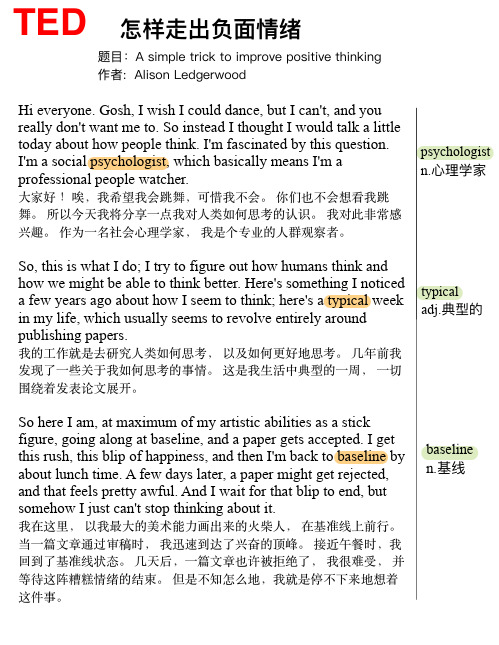
psychologist n.心理学家
So, this is what I do; I try to figure out how humans think and how we might be able to think better. Here's something I noticed a few years ago about how I seem to think; here's a typical week in my life, which usually seems to revolve entirely around publishing papers.
We conducted another experiment.
adj.最初的
我们也告诉第二组实验者, “你们也可以认为手术有七成可能成功。” 与
第一组不同的是,他们保持了原有意见, 他们似乎从始至终都在 一开始
的损失框架下思考。 我们还做了另外一个实验。
This time we told participants about the current governor of an important state who is running for re-election against his opponent. We again had two groups of participants, and we described the current governor's track record to them in one of two ways. We said that when the current governor took office, statewide budget cuts were expected to affect of about 10,000 jobs, and then half of the participants read that under the current governor's leadership 40% of these jobs had been saved.
TED英文演讲稿:Why you will fail to have a great career_演讲稿
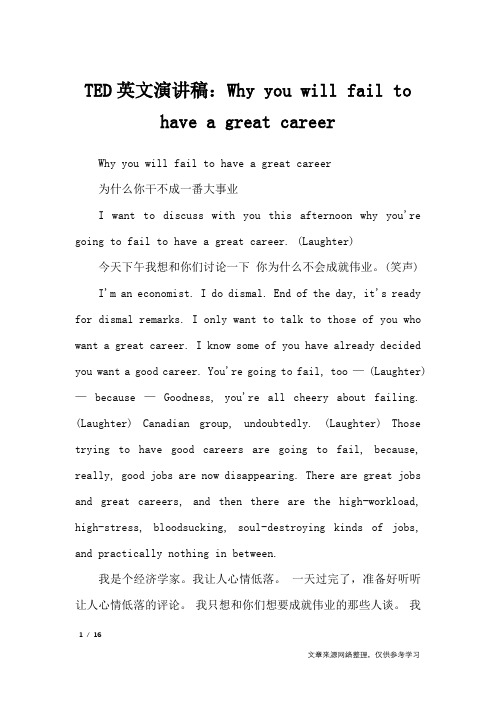
TED英文演讲稿:Why you will fail tohave a great careerWhy you will fail to have a great career为什么你干不成一番大事业I want to discuss with you this afternoon why you're going to fail to have a great career. (Laughter) 今天下午我想和你们讨论一下你为什么不会成就伟业。
(笑声) I'm an economist. I do dismal. End of the day, it's ready for dismal remarks. I only want to talk to those of you who want a great career. I know some of you have already decided you want a good career. You're going to fail, too —(Laughter) —because —Goodness, you're all cheery about failing. (Laughter) Canadian group, undoubtedly. (Laughter) Those trying to have good careers are going to fail, because, really, good jobs are now disappearing. There are great jobs and great careers, and then there are the high-workload, high-stress, bloodsucking, soul-destroying kinds of jobs, and practically nothing in between.我是个经济学家。
TED英文演讲:生活中你的真实想法
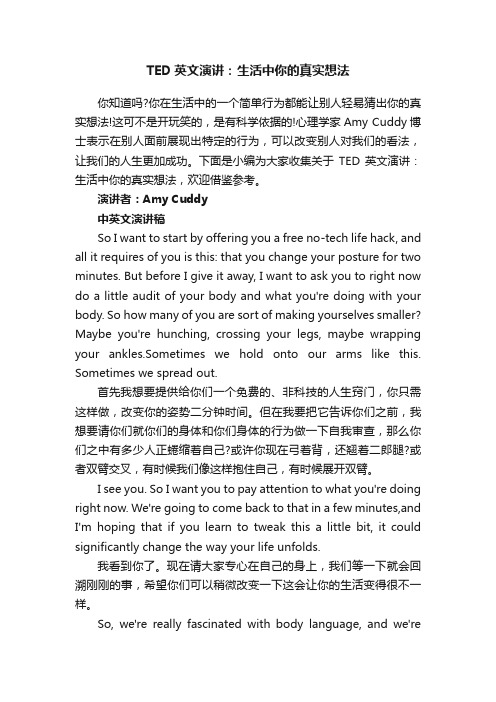
TED英文演讲:生活中你的真实想法你知道吗?你在生活中的一个简单行为都能让别人轻易猜出你的真实想法!这可不是开玩笑的,是有科学依据的!心理学家Amy Cuddy博士表示在别人面前展现出特定的行为,可以改变别人对我们的看法,让我们的人生更加成功。
下面是小编为大家收集关于TED英文演讲:生活中你的真实想法,欢迎借鉴参考。
演讲者:Amy Cuddy中英文演讲稿So I want to start by offering you a free no-tech life hack, and all it requires of you is this: that you change your posture for two minutes. But before I give it away, I want to ask you to right now do a little audit of your body and what you're doing with your body. So how many of you are sort of making yourselves smaller? Maybe you're hunching, crossing your legs, maybe wrapping your ankles.Sometimes we hold onto our arms like this. Sometimes we spread out.首先我想要提供给你们一个免费的、非科技的人生窍门,你只需这样做,改变你的姿势二分钟时间。
但在我要把它告诉你们之前,我想要请你们就你们的身体和你们身体的行为做一下自我审查,那么你们之中有多少人正蜷缩着自己?或许你现在弓着背,还翘着二郎腿?或者双臂交叉,有时候我们像这样抱住自己,有时候展开双臂。
I see you. So I want you to pay attention to what you're doing right now. We're going to come back to that in a few minutes,and I'm hoping that if you learn to tweak this a little bit, it could significantly change the way your life unfolds.我看到你了。
TED英文演讲稿:Whyyouwillfailtohaveagreatcareer
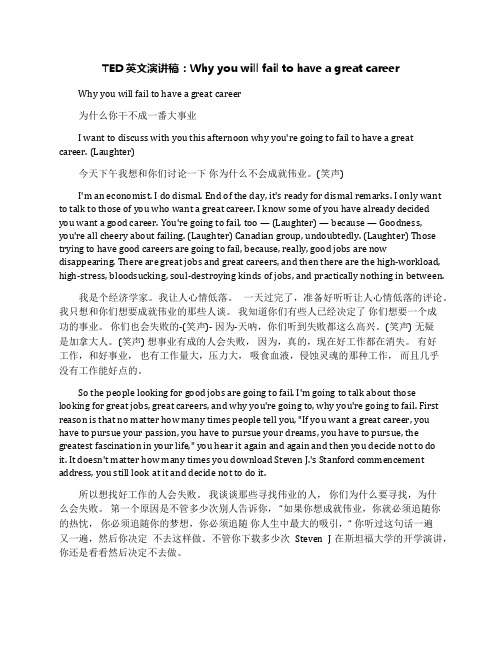
TED英文演讲稿:Why you will fail to have a great career Why you will fail to have a great career为什么你干不成一番大事业I want to discuss with you this afternoon why you're going to fail to have a great career. (Laughter)今天下午我想和你们讨论一下你为什么不会成就伟业。
(笑声)I'm an economist. I do dismal. End of the day, it's ready for dismal remarks. I only want to talk to those of you who want a great career. I know some of you have already decided you want a good career. You're going to fail, too — (Laughter) — because — Goodness,you're all cheery about failing. (Laughter) Canadian group, undoubtedly. (Laughter) Those trying to have good careers are going to fail, because, really, good jobs are now disappearing. There are great jobs and great careers, and then there are the high-workload, high-stress, bloodsucking, soul-destroying kinds of jobs, and practically nothing in between.我是个经济学家。
TED演讲为什么认为自己丑会对你不利
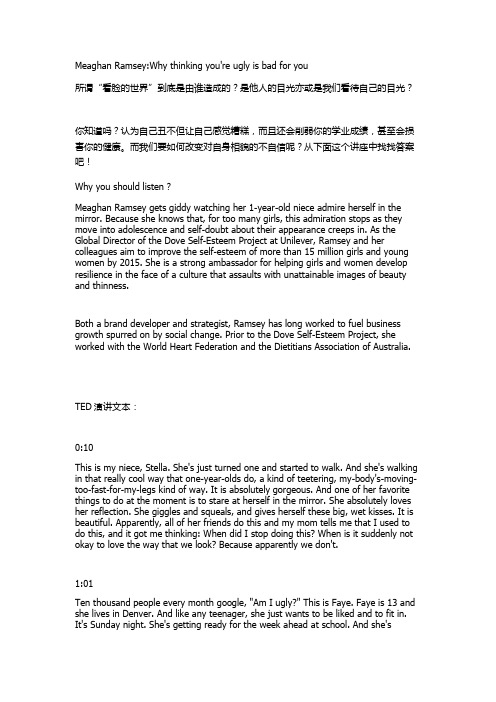
Meaghan Ramsey:Why thinking you're ugly is bad for you所谓“看脸的世界”到底是由谁造成的?是他人的目光亦或是我们看待自己的目光?你知道吗?认为自己丑不但让自己感觉糟糕,而且还会削弱你的学业成绩,甚至会损害你的健康。
而我们要如何改变对自身相貌的不自信呢?从下面这个讲座中找找答案吧!Why you should listen?Meaghan Ramsey gets giddy watching her 1-year-old niece admire herself in the mirror. Because she knows that, for too many girls, this admiration stops as they move into adolescence and self-doubt about their appearance creeps in. As the Global Director of the Dove Self-Esteem Project at Unilever, Ramsey and her colleagues aim to improve the self-esteem of more than 15 million girls and young women by 2015. She is a strong ambassador for helping girls and women develop resilience in the face of a culture that assaults with unattainable images of beauty and thinness.Both a brand developer and strategist, Ramsey has long worked to fuel business growth spurred on by social change. Prior to the Dove Self-Esteem Project, she worked with the World Heart Federation and the Dietitians Association of Australia.TED演讲文本:0:10This is my niece, Stella. She's just turned one and started to walk. And she's walking in that really cool way that one-year-olds do, a kind of teetering, my-body's-moving- too-fast-for-my-legs kind of way. It is absolutely gorgeous. And one of her favorite things to do at the moment is to stare at herself in the mirror. She absolutely loves her reflection. She giggles and squeals, and gives herself these big, wet kisses. It is beautiful. Apparently, all of her friends do this and my mom tells me that I used to do this, and it got me thinking: When did I stop doing this? When is it suddenly not okay to love the way that we look? Because apparently we don't.1:01Ten thousand people every month google, "Am I ugly?" This is Faye. Faye is 13 and she lives in Denver. And like any teenager, she just wants to be liked and to fit in. It's Sunday night. She's getting ready for the week ahead at school. And she'sslightly dreading it, and she's a bit confused because despite her mom telling her all the time that she's beautiful, every day at school, someone tells her that she's ugly. Because of the difference between what her mom tells her and what her friends atschool, or her peers at school are telling her, she doesn't know who to believe. So, she takes a video of herself. She posts it to YouTube and she asks people to please leave a comment: "Am I pretty or am I ugly?" Well, so far, Faye has received over 13,000 comments. Some of them are so nasty, they don't bear thinking about. This is an average, healthy-looking teenage girl receiving this feedback at one of the most emotionally vulnerable times in her life. Thousands of people are posting videos like this, mostly teenage girls, reaching out in this way. But what's leading them to do this?2:18Well, today's teenagers are rarely alone. They're under pressure to be online and available at all times, talking, messaging, liking, commenting, sharing, posting — it never ends. Never before have we been so connected, so continuously, so instantaneously, so young. And as one mom told me, it's like there's a party in their bedroom every night. There's simply no privacy. And the social pressures that go along with that are relentless. This always-on environment is training our kids to value themselves based on the number of likes they get and the types of comments that they receive. There's no separation between online and offline life. What's real or what isn't is really hard to tell the difference between. And it's also really hard to tell the difference between what's authentic and what's digitally manipulated. What's a highlight in someone's life versus what's normal in the context of everyday.3:25And where are they looking to for inspiration? Well, you can see the kinds of images that are covering the newsfeeds of girls today. Size zero models still dominate our catwalks. Airbrushing is now routine. And trends like #thinspiration, #thighgap,#bikinibridge and #proana. For those who don't know, #proana means pro-anorexia. These trends are teamed with the stereotyping and flagrant objectification of women in today's popular culture. It is not hard to see what girls are benchmarking themselves against. But boys are not immune to this either. Aspiring to the chiseled jaw lines and ripped six packs of superhero-like sports stars and playboy music artists.4:11But, what's the problem with all of this? Well, surely we want our kids to grow up as healthy, well balanced individuals. But in an image-obsessed culture, we are training our kids to spend more time and mental effort on their appearance at the expense of all of the other aspects of their identities. So, things like their relationships, the development of their physical abilities, and their studies and so on begin to suffer. Six out of 10 girls are now choosing not to do something because they don't think they look good enough. These are not trivial activities. These are fundamentalactivities to their development as humans and as contributors to society and to the workforce. Thirty-one percent, nearly one in three teenagers, are withdrawing from classroom debate. They're failing to engage in classroom debate because they don'twant to draw attention to the way that they look. One in five are not showing up to class at all on days when they don't feel good about it. And when it comes to exams, if you don't think you look good enough, specifically if you don't think you are thin enough, you will score a lower grade point average than your peers who are not concerned with this. And this is consistent across Finland, the U.S. and China, and is true regardless of how much you actually weigh. So to be super clear, we're talking about the way you think you look, not how you actually look. Low body confidence is undermining academic achievement.5:54But it's also damaging health. Teenagers with low body confidence do less physical activity, eat less fruits and vegetables, partake in more unhealthy weight control practices that can lead to eating disorders. They have lower self-esteem. They're more easily influenced by people around them and they're at greater risk of depression. And we think it's for all of these reasons that they take more risks with things like alcohol and drug use; crash dieting; cosmetic surgery; unprotected, earlier sex; and self-harm. The pursuit of the perfect body is putting pressure on our healthcare systems and costing our governments billions of dollars every year.6:39And we don't grow out of it. Women who think they're overweight — again, regardless of whether they are or are not — have higher rates of absenteeism. Seventeen percent of women would not show up to a job interview on a day when they weren't feeling confident about the way that they look.7:00Have a think about what this is doing to our economy. If we could overcome this, what that opportunity looks like. Unlocking this potential is in the interest of every single one of us.7:14But how do we do that? Well, talking, on its own, only gets you so far. It's not enough by itself. If you actually want to make a difference, you have to do something. And we've learned there are three key ways: The first is we have to educate for body confidence. We have to help our teenagers develop strategies to overcome image-related pressures and build their self-esteem. Now, the good news is that there are many programs out there available to do this. The bad news is that most of them don't work. I was shocked to learn that many well-meaning programs are inadvertently actually making the situation worse. So we need to make damnsure that the programs that our kids are receiving are not only having a positive impact, but having a lasting impact as well.8:08And the research shows that the best programs address six key areas: The first is the influence of family, friends and relationships. The second is media and celebrity culture, then how to handle teasing and bullying, the way we compete and compare with one another based on looks, talking about appearance — some people call this "body talk" or "fat talk" — and finally, the foundations of respecting and looking after yourself. These six things are crucial starting points for anyone serious about delivering body-confidence education that works. An education is critical, but tackling this problem is going to require each and everyone of us to step up and be better role models for the women and girls in our own lives. Challenging the status quo of how women are seen and talked about in our own circles.9:01It is not okay that we judge the contribution of our politicians by their haircuts or the size of their breasts, or to infer that the determination or the success of an Olympian is down to her not being a looker. We need to start judging people by what they do, not what they look like.9:22We can all start by taking responsibility for the types of pictures and comments that we post on our own social networks. We can compliment people based on their effort and their actions and not on their appearance.9:38And let me ask you, when was the last time that you kissed a mirror? Ultimately, we need to work together as communities, as governments and as businesses to really change this culture of ours so that our kids grow up valuing their whole selves, valuing individuality, diversity, inclusion. We need to put the people that are making a real difference on our pedestals, making a difference in the real world. Giving them the airtime, because only then will we create a different world. A world where our kids are free to become the best versions of themselves, where the way they think they look never holds them back from being who they are or achieving what they want in life.10:28Think about what this might mean for someone in your life. Who have you got in mind? Is it your wife? Your sister? Your daughter? Your niece? Your friend? It could just be the woman a couple of seats away from you today. What would it mean forher if she were freed from that voice of her inner critic, nagging her to have longer legs, thinner thighs, smaller stomach, shorter feet? What could it mean for her if we overcame this and unlocked her potential in that way?11:06Right now, our culture's obsession with image is holding us all back. But let's show our kids the truth. Let's show them that the way you look is just one part of your identity and that the truth is we love them for who they are and what they do and how they make us feel. Let's build self-esteem into our school curriculums. Let's each and every one of us change the way we talk and compare ourselves to other people. And let's work together as communities, from grassroots to governments, so that the happy little one-year-olds of today become the confident changemakers of tomorrow. Let's do this. (Applause)更多英语学习方法:企业英语培训/。
TED励志演讲稿中英对照
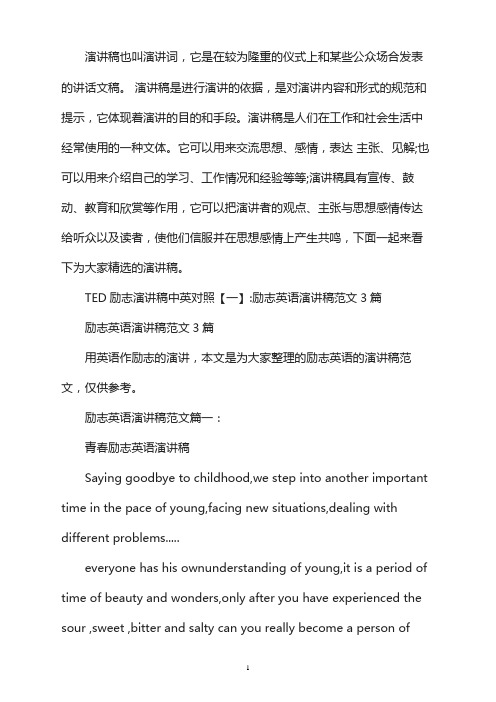
演讲稿也叫演讲词,它是在较为隆重的仪式上和某些公众场合发表的讲话文稿。
演讲稿是进行演讲的依据,是对演讲内容和形式的规范和提示,它体现着演讲的目的和手段。
演讲稿是人们在工作和社会生活中经常使用的一种文体。
它可以用来交流思想、感情,表达主张、见解;也可以用来介绍自己的学习、工作情况和经验等等;演讲稿具有宣传、鼓动、教育和欣赏等作用,它可以把演讲者的观点、主张与思想感情传达给听众以及读者,使他们信服并在思想感情上产生共鸣,下面一起来看下为大家精选的演讲稿。
TED励志演讲稿中英对照【一】:励志英语演讲稿范文3篇励志英语演讲稿范文3篇用英语作励志的演讲,本文是为大家整理的励志英语的演讲稿范文,仅供参考。
励志英语演讲稿范文篇一:青春励志英语演讲稿Saying goodbye to childhood,we step into another important time in the pace of young,facing new situations,dealing with different problems.....everyone has his ownunderstanding of young,it is a period of time of beauty and wonders,only after you have experienced the sour ,sweet ,bitter and salty can you really become a person ofsignificance.thre time of young is limitted,it may pass by without your attention,and when you discover what has happened ,it is always too late.grasping the young well means a better time is waiting for you in the near future,or the situation may be opposite .having a view on these great men in the history of hunmanbeing,they all made full use of their youth time ,to do things that are useful to society,to the whole mankind,and as a cosquence ,they are remembered by latergenerations,admired by everyone.so do something in the time of young,although you may not get achievements as these greatmen did ,though not for the whole word,just for youeself,for those around!the young is just like blooming flowers,they are so beautiful when blooming,they make people feel happy,but with time passing by,after they withers ,moet people think they are ugly.and so it is the same with young,we are enthusiastic when we are young,then we may lose ourpassion when getting older and older.so we must treasureit ,don't let the time pass by .励志英语演讲稿范文篇二:good evening , ladies and gentlemen . i am joy and glad to give you a speech about stress , yes , just the topic you see on the screen.psychologist tell us that stress is a state of worry caused by the problem of living , such as too much work or study , heavy responsibilities , and quickened pace of life .statistics show that stress comes from every detail in our life . financial problems , poor health , being laid off may be the stress that most adults now suffering . as students in the university , we are also under our special stress . while study , having to take various tests and submit a project against a deadline may put a great pressure on us . and the things make us felt stressed may be our parents's greater expectations on us than we could reach . later , when we are likely to graduate , some other problems will also annoy us . i think we will worry a lot about our ability to compete in the job market and how we can best use what we've learned at college in our future job .励志英语演讲稿范文篇三:ladies and gentlemen , good afternoon! i'm very glad to stand here and give you a short speech. today my topic is ―youth‖. i hope you will like it , and found the importance in your youth so that more cherish it.first i want to ask you some questions:1、do you know what is youth?2、how do you master your youth?youthyouth is not a time of life, it is a state of mind ; it is not rosy cheeks , red lips and supple knees, it is a matter of the emotions : it is the freshness ; it is the freshness of the deep springs of life .youth means a temperamental predominance of courage over timidity of the appetite , for adventure over the love of ease. this often exists in a man of 60 more than a boy of 20 . nobody grows old merely by a number of years . we grow old by deserting our ideals.years wrinkle the skin , but to give up enthusiasm wrinkles the soul . worry , fear , self –distrust bows the heart and turns the spirit back to dust .whether 60 of 16 , there is in every human being ?s heart the lure of wonders, the unfailing childlike appetite of what's next and the joy of the game of living . in the center of your heart and my heart there's a wireless station : so long as it receives messages of beauty , hope ,cheer, courage and power from men and from the infinite, so long as you are young .when the aerials are down , and your spirit is covered with snows ofcynicism and the ice of pessimism, then you are grownold ,even at 20 , but as long as your aerials are up ,to catch waves of optimism , there is hope you may die young at 80.thank you!TED励志演讲稿中英对照【二】:TED演讲中英对照1At every stage of our lives we make decisions that will profoundly influence the lives of the people we're going to become, and then when we become thosepeople, we're not always thrilled with the decisions we made. So young people pay good money to get tattoos removed that teenagers paid good money to get.Middle-aged people rushed to divorce people who young adults rushed to marry. Older adults work hard to lose what middle-aged adults worked hard to gain. On and on and on. The question is, as a psychologist, that fascinates me is, why do we make decisions that our future selves so often regret?在我们生命的每个阶段,我们都会做出一些决定,这些决定会深刻影响未来我们自己的生活,当我们成为未来的自己时,我们并不总是对过去做过的决定感到高兴。
TED英文演讲稿:Why

TED英文演讲稿:Why(最新版)编制人:__________________审核人:__________________审批人:__________________编制单位:__________________编制时间:____年____月____日序言下载提示:该文档是本店铺精心编制而成的,希望大家下载后,能够帮助大家解决实际问题。
文档下载后可定制修改,请根据实际需要进行调整和使用,谢谢!并且,本店铺为大家提供各种类型的经典范文,如演讲稿、祝福语、主持词、欢迎词、自我介绍、合同协议、条据书信、报告总结、工作计划、作文大全、其他范文等等,想了解不同范文格式和写法,敬请关注!Download tips: This document is carefully compiled by this editor.I hope that after you download it, it can help you solve practical problems. The document can be customized and modified after downloading, please adjust and use it according to actual needs, thank you!In addition, this shop provides you with various types of classic sample essays, such as speech drafts, blessings, host speech, welcome speech, self-introduction, contract agreement, letter of agreement, report summary, work plan, essay encyclopedia, other sample essays, etc. Want to know the format and writing of different sample essays, so stay tuned!TED英文演讲稿:WhyWhy you will fail to have a great career为什么你干不成一番大事业I want to discuss with you this afternoon why you're going to fail to have a great career. (Laughter)今天下午我想和你们讨论一下你为什么不会成就伟业。
TED演讲:我们以为自己知道的事中英文
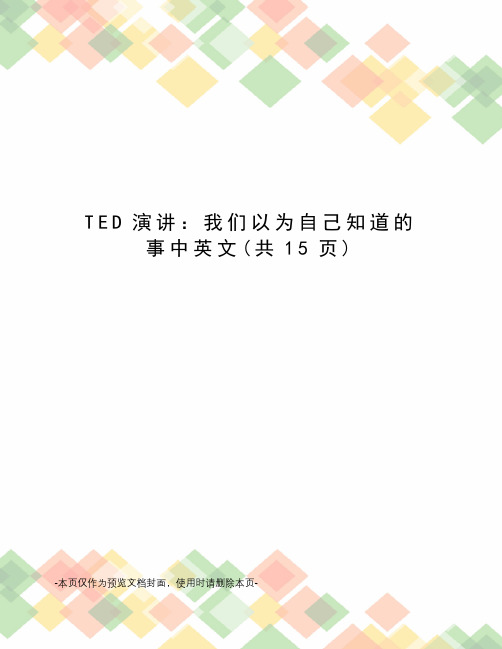
T E D演讲:我们以为自己知道的事中英文(共15页)-本页仅作为预览文档封面,使用时请删除本页-TED演讲:我们以为自己知道的事中英文这是一篇由网络搜集整理的关于TED演讲:我们以为自己知道的事中英文的文档,希望对你能有帮助。
以下是演讲全文:I'm going to try and explain why it is that perhaps we don't understand as much as we think we do. I'd like to begin with four questions. This is not some sort of cultural thing for the time of year. That's an in-joke, by the way.我会试着解释为何我们知道的东西很可能并没有我们自以为知道的多我想从四个问题开始,不是那种今年流行的文化问题对了,刚刚那句是个圈内笑话But these four questions, actually, are ones that people who even know quite a lot about science find quite hard. And they're questions that I've asked of science television producers, of audiences of science educators -- so that's science teachers -- and also of seven-year-olds, and I find that the seven-year-olds do marginally better than the other audiences, which is somewhat surprising.不过这四个问题,事实上即使是很懂科学的人也会觉得很难应答我拿这些问题去问科学节目制片人问那些有科学教育背景的观众也问教科学的老师还有七岁孩童我发现七岁孩童答得比其他人好这是有些令人惊讶So the first question, and you might want to write this down, either on a bit of paper, physically, or a virtual piece of paper in your head. And, for viewers at home, you can try this as well.第一个问题,我建议你把问题记下来抄在纸上,或想像中的纸上坐在电脑前的你也可以试着作答.A little seed weighs next to nothing and a tree weighs a lot, right I think we agree on that. Where does the tree get the stuffthat makes up this chair, right Where does all this stuff come from 种籽很轻,而大树很重,是吗我想我们都同意吧,大树用来制成椅子的东西是从哪来的对吧这些东西都是怎么来的(Knocks)(敲椅声)And your next question is, can you light a little torch-bulbwith a battery, a bulb and one piece of wire And would you be able to, kind of, draw a -- you don't have to draw the diagram, but would you be able to draw the diagram, if you had to do it Or would you just say, that's actually not possible问题二,你能否点亮一个小灯泡只用1个电池、1个灯泡、和1条电线那你能画出上述问题的图解吗不用真的画但如果需要的话,你能画出来吗还是你会说这个不可能The third question is, why is it hotter in summer than inwinter I think we can probably agree that it is hotter in summer thanin winter, but why And finally, would you be able to -- and you can sort of scribble it, if you like -- scribble a plan diagram of the solar system, showing the shape of the planets' orbits Would you be able to do that And if you can, just scribble a pattern.第三个问题,为什么夏天比冬天热大家应该都同意夏天比冬天还热但为何如此最后,你能不能简单的勾勒出太阳系的平面图... 呈现出行星轨道运行的形状你可以画得出来吗你画得出来的话,就把形状画出来OK. Now, children get their ideas not from teachers, asteachers often think, but actually from common sense, from experience of the world around them, from all the things that go on between them and their peers, and their carers, and their parents, and all of that. Experience. And one of the great experts in this field, of course, was, bless him, Cardinal Wolsey. Be very careful what you get into people's heads because it's virtually impossible to shift it afterwards, right?好,孩童对事物的概念不是老师教的老师时常这么以为,但实际上概念来自于常理来自于孩童对周遭世界的体验来自于他们跟同伴彼此交流还有跟保姆、父母亲、所有人交流的经验这个领域中的一个专家,对了,愿他安息就是渥西主教,他说要你将东西放进其他人的闹袋里的时候要小心因为那些东西几乎不会再改变,对吧?(Laughter)(笑声)I'm not quite sure how he died, actually. Was he beheaded inthe end, or hung?我不太清楚他的死因,真的他最后上了断头台还是被吊死(Laughter)(笑声)Now, those questions, which, of course, you've got right, and you haven't been conferring, and so on. And I -- you know, normally,I would pick people out and humiliate, but maybe not in this instance.现在回到那四个问题,大家都知道是什么问题了你们彼此之间也没有讨论答案我平时习惯点人站起来回答让他丢脸不过这次就不点了A little seed weighs a lot and, basically, all this stuff, 99 percent of this stuff, came out of the air. Now, I guarantee that about 85 percent of you, or maybe it's fewer at TED, will have saidit comes out of the ground. And some people, probably two of you,will come up and argue with me afterwards, and say that actually, it comes out of the ground. Now, if that was true, we'd have trucksgoing round the country, filling people's gardens in with soil, it'd be a fantastic business. But, actually, we don't do that. The mass of this comes out of the air. Now, I passed all my biology exams in Britain. I passed them really well, but I still came out of school thinking that that stuff came out of the ground.种籽可以很重,基本上所有的这些 99%都来自于空气我相信有85%的人,或许在你们TED会比较少会说木材来自于大地,而有些人也许你们中的一两位,可能结束后会来找我争论说木材其实是来自于大地若是如此,那我们就会有让卡车跑来跑去把人们的花园都填上土,那会是很棒的生意。
Why Thinking You're Ugly Is Bad for You - Meaghan Ramsey
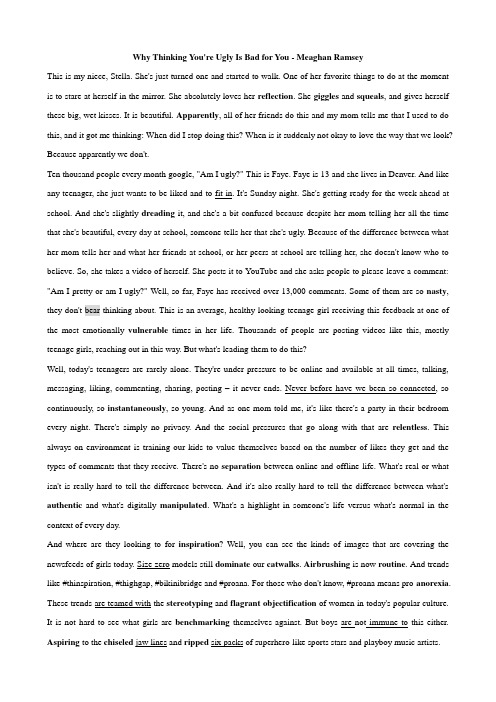
Why Thinking You're Ugly Is Bad for You - Meaghan RamseyThis is my niece, Stella. She's just turned one and started to walk. One of her favorite things to do at the moment is to stare at herself in the mirror. She absolutely loves her reflection. She giggles and squeals, and gives herself these big, wet kisses. It is beautiful. Apparently, all of her friends do this and my mom tells me that I used to do this, and it got me thinking: When did I stop doing this? When is it suddenly not okay to love the way that we look? Because apparently we don't.Ten thousand people every month google, "Am I ugly?" This is Faye. Faye is 13 and she lives in Denver. And like any teenager, she just wants to be liked and to fit in. It's Sunday night. She's getting ready for the week ahead at school. And she's slightly dreading it, and she's a bit confused because despite her mom telling her all the time that she's beautiful, every day at school, someone tells her that she's ugly. Because of the difference between what her mom tells her and what her friends at school, or her peers at school are telling her, she doesn't know who to believe. So, she takes a video of herself. She posts it to YouTube and she asks people to please leave a comment: "Am I pretty or am I ugly?" Well, so far, Faye has received over 13,000 comments. Some of them are so nasty, they don't bear thinking about. This is an average, healthy-looking teenage girl receiving this feedback at one of the most emotionally vulnerable times in her life. Thousands of people are posting videos like this, mostly teenage girls, reaching out in this way. But what's leading them to do this?Well, today's teenagers are rarely alone. They're under pressure to be online and available at all times, talking, messaging, liking, commenting, sharing, posting –it never ends. Never before have we been so connected, so continuously, so instantaneously, so young. And as one mom told me, it's like there's a party in their bedroom every night. There's simply no privacy. And the social pressures that go along with that are relentless. This always-on environment is training our kids to value themselves based on the number of likes they get and the types of comments that they receive. There's no separation between online and offline life. What's real or what isn't is really hard to tell the difference between. And it's also really hard to tell the difference between what's authentic and what's digitally manipulated. What's a highlight in someone's life versus what's normal in the context of every day.And where are they looking to for inspiration? Well, you can see the kinds of images that are covering the newsfeeds of girls today. Size zero models still dominate our catwalks. Airbrushing is now routine. And trends like #thinspiration, #thighgap, #bikinibridge and #proana. For those who don't know, #proana means pro-anorexia. These trends are teamed with the stereotyping and flagrant objectification of women in today's popular culture. It is not hard to see what girls are benchmarking themselves against. But boys are not immune to this either. Aspiring to the chiseled jaw lines and ripped six packs of superhero-like sports stars and playboy music artists.But, what's the problem with all of this? Well, surely we want our kids to grow up as healthy, well balanced individuals. But in an image-obsessed culture, we are training our kids to spend more time and mental effort on their appearance at the expense of all of the other aspects of their identities. So, things like their relationships, the development of their physical abilities, and their studies and so on begin to suffer. Six out of 10 girls are now choosing not to do something because they don't think they look good enough. These are not trivial activities. These are fundamental activities to their development as humans and as contributors to society and to the workforce. Thirty-one percent, nearly one in three teenagers, are withdrawing from classroom debate. They're failing to engage in classroom debate because they don't want to draw attention to the way that they look. One in five are not showing up to class at all on days when they don't feel good about it. And when it comes to exams, if you don't think you look good enough, specifically if you don't think you are thin enough, you will score a lower grade point average than your peers who are not concerned with this. And this is consistent across Finland, the U.S. and China, and is true regardless of how much you actually weigh. So to be super clear, we're talking about the way you think you look, not how you actually look. Low body confidence is undermining academic achievement. But it's also damaging health. Teenagers with low body confidence do less physical activity, eat less fruits and vegetables, partake in more unhealthy weight control practices that can lead to eating disorders. They have lower self-esteem. They're more easily influenced by people around them and they're at greater risk of depression. And we think it's for all of these reasons that they take more risks with things like alcohol and drug use; crash dieting; cosmetic surgery; unprotected, earlier sex; and self-harm. The pursuit of the perfect body is putting pressure on our healthcare systems and costing our governments billions of dollars every year.And we don't grow out of it. Women who think they're overweight – again, regardless of whether they are or are not – have higher rates of absenteeism. Seventeen percent of women would not show up to a job interview on a day when they weren't feeling confident about the way that they look. Have a think about what this is doing to our economy. If we could overcome this, what that opportunity looks like. Unlocking this potential is in the interest of every single one of us.But how do we do that? Well, talking, on its own, only gets you so far. It's not enough by itself. If you actually want to make a difference, you have to do something. And we've learned there are three key ways. The first is we have to educate for body confidence. We have to help our teenagers develop strategies to overcome image-related pressures and build their self-esteem. Now, the good news is that there are many programs out there available to do this. The bad news is that most of them don't work. I was shocked to learn that many well-meaning programs are in advertently actually making the situation worse. So we need to make damn sure that the programs that our kids are receiving are not only having a positive impact, but having a lasting impact as well.And the research shows that the best programs address six key areas. The first is the influence of family, friends and relationships. The second is media and celebrity culture, then how to handle teasing and bullying, the way we compete and compare with one another based on looks, talking about appearance – some people call this "body talk" or "fat talk" –and finally, the foundations of respecting and looking after yourself. These six things are crucial starting points for anyone serious about delivering body-confidence education that works. An education is critical, but tackling this problem is going to require each and every one of us to step up and be better role models for the women and girls in our own lives. Challenging the status quo of how women are seen and talked about in our own circles.It is not okay that we judge the contribution of our politicians by their haircuts or the size of their breasts, or to infer that the determination or the success of an Olympian is down to her not being a looker. We need to start judging people by what they do, not what they look like. We can all start by taking responsibility for the types of pictures and comments that we post on our own social networks. We can compliment people based on their effort and their actions and not on their appearance.And let me ask you, when was the last time that you kissed a mirror? Ultimately, we need to work together as communities, as governments and as businesses to really change this culture of ours so that our kids grow up valuing their whole selves, valuing individuality, diversity, inclusion. We need to put the people that are making a real difference on our pedestals, making a difference in the real world. Giving them the airtime, because only then will we create a different world. A world where our kids are free to become the best versions of themselves, where the way they think they look never holds them back from being who they are or achieving what they want in life.Think about what this might mean for someone in your life. Who have you got in mind? Is it your wife? Your sister? Your daughter? Your niece? Your friend? It could just be the woman a couple of seats away from you today. What would it mean for her if she were freed from that voice of her inner critic, nagging her to have longer legs, thinner thighs, smaller stomach, shorter feet? What could it mean for her if we overcame this and unlocked her potential in that way?Right now, our culture's obsession with image is holding us all back. But let's show our kids the truth. Let's show them that the way you look is just one part of your identity and that the truth is we love them for who they are and what they do and how they make us feel. Let's build self-esteem into our school curriculums. Let each and every one of us change the way we talk and compare ourselves to other people. And let's work together as communities, from grassroots to governments, so that the happy little one-year-olds of today become the confident changemakers of tomorrow. Let's do this.。
TED演讲:犯错的价值不可忽视
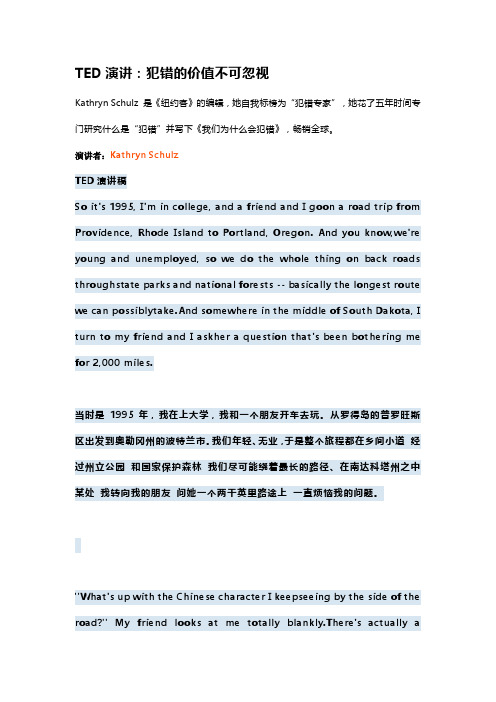
TED演讲:犯错的价值不可忽视Kathryn Schulz 是《纽约客》的编辑,她自我标榜为“犯错专家”,她花了五年时间专门研究什么是“犯错”并写下《我们为什么会犯错》,畅销全球。
演讲者:Kathryn SchulzTED演讲稿So it's 1995, I'm in college, and a friend and I goon a road trip from Providence, Rhode Island to Portland, Oregon. And you know,we're young and unemployed, so we do the whole thing on back roads throughstate parks and national forests -- basically the longest route we can possiblytake.And somewhere in the middle of South Dakota, I turn to my friend and I askher a question that's been bothering me for 2,000 miles.当时是1995年,我在上大学,我和一个朋友开车去玩。
从罗得岛的普罗旺斯区出发到奥勒冈州的波特兰市。
我们年轻、无业,于是整个旅程都在乡间小道经过州立公园和国家保护森林我们尽可能绕着最长的路径、在南达科塔州之中某处我转向我的朋友问她一个两千英里路途上一直烦恼我的问题。
"What's up with the Chinese character I keepseeing by the side of the road?" My friend looks at me totally blankly.There's actually agentleman in the front row who's doing a perfect imitationof her look. And I'm like, "You know, all the signs we keep seeing withthe Chinese character on them." She just stares at me for a few moments,and then she cracks up, because she figures out what I'm talking about."路边那个一直出现的中文字到底是什么?"我的朋友露出疑惑的神情,正如现在坐在第一排的这三位男士所露出的神情一样(笑声)我说"你知道的我们一直看到的那个路牌写着中文的那个啊"她瞪着我的脸一阵子突然笑开了因为她总算知道我所指为何。
TED演讲——不要固执于英语英文字幕
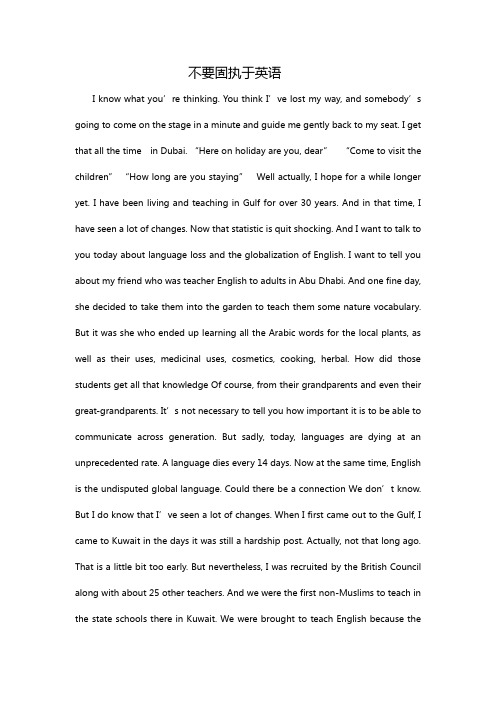
不要固执于英语I know what you’re thinking. You think I’ve lost my way, and somebody’s going to come on the stage in a minute and guide me gently back to my seat. I get that all the time in Dubai. “Here on holiday are you, dear”“Come to visit the children”“How long are you staying”Well actually, I hope for a while longer yet. I have been living and teaching in Gulf for over 30 years. And in that time, I have seen a lot of changes. Now that statistic is quit shocking. And I want to talk to you today about language loss and the globalization of English. I want to tell you about my friend who was teacher English to adults in Abu Dhabi. And one fine day, she decided to take them into the garden to teach them some nature vocabulary. But it was she who ended up learning all the Arabic words for the local plants, as well as their uses, medicinal uses, cosmetics, cooking, herbal. How did those students get all that knowledge Of course, from their grandparents and even their great-grandparents. It’s not necessary to tell you how important it is to be able to communicate across generation. But sadly, today, languages are dying at an unprecedented rate. A language dies every 14 days. Now at the same time, English is the undisputed global language. Could there be a connection We don’t know. But I do know that I’ve seen a lot of changes. When I first came out to the Gulf, I came to Kuwait in the days it was still a hardship post. Actually, not that long ago. That is a little bit too early. But nevertheless, I was recruited by the British Council along with about 25 other teachers. And we were the first non-Muslims to teach in the state schools there in Kuwait. We were brought to teach English because thegovernment wanted to modernize the country and empower the citizens through education. And of course, the . benefited from some of that lovely oil wealth.Okay. Now this is the major change that I’ve seen how teaching English has morphed from being a mutually beneficial practice to becoming a massive international business that it is today. No longer just a foreign language on the school curriculum. And no longer the sole domain of mother England. It has become a bandwagon for every English-speaking nation on earth. And why not After all, the best education according to the latest World University Rankings is to be found in the universities of the . and the . So everybody wants to have an English education, naturally. But if you’re not a native speaker, you have to pass a test. Now can it be right to reject a student on linguistic ability alone Perhaps you have a computer scientist who’s a genius. Would he need the same language as a lawyer, for example Well, I don’t think so. We English teachers reject them all the time. We put a stop sign, and we stop them in their tracks. They can’t pursue their dream any longer, till they get English. Now let me put it this way, if I met a monolingual Dutch speaker who had the cure for cancer, would I stop him from entering my British University I don’t think so. But indeed, that is exactly what we do. We English teachers are the gatekeepers. And you have to satisfy us first that your English is good enough. Now it can be dangerous to give too much power, to a narrow segment of society. Maybe the barrier would be too university. Okay.“But,” I hear you say, “What about the research It’s all in English.” So the books are in English, the journals are done in English, but that is self-fulfillingprophecy. It deeds the English requirement. And so it goes on. I ask you, what happened to translation If you think about the Islamic Golden Age, there was lots of translation then. They translate from Latin and Greek into Arabic, into Persian, and then it was translated on into the Germanic languages of Europe and the Romance languages. And so light shone upon the Dark Ages of Europe. Now don’t get me wrong. I am not against teaching English, all you English teachers out there. I love thatwe have a global language. We need one today more than ever. But I am against using it as a barrier. Do we really want to end up with 600 languages and the main one being English and Chinese We need more than that. Where do we draw the line This system equates intelligence with a knowledge of English which is quite arbitrary. And I want to remind you that the giant upon whose shoulders today’s intelligentsia stand did not have to have English, they didn’t have to pass an English test. Case in point, Einstein. He, by the way, was considered remedial at school because he was, in fact, dyslexic. But fortunately for the world, he did not have to pass an English test. Because they didn’t start until 1964 with TOEFL, the American Test of English. Now it’s exploded. There are lots and lots of tests of English. And millions and millions of students take these tests every year. Now you might think, you and me, those fees aren’t bad, they’re okay, but they are prohibitive to so many millions of poor people. So immediately, we’re rejecting them. It brings to mind a headline I saw recently: “Education: The Great Divide.”Now I get it, I understand why people would focus on English. They want to give their children the best chance in the life. And to do that, they need a Westerneducation. Because, of course, the best jobs go to people out of the Western Universities, that I put on earlier. It’s a circular thing.Okay. Let me tell you a story about two scientists, two English scientists. They were doing an experiment to do with genetics and the forelimbs and the hind limbs of animals. But they couldn’t get the results they wanted. They really didn’t know what to do, until along came a German scientist who realized that they were using two words for forelimb and hind limb, whereas genetics does not differentiate and neither does German. So bingo, problem solved. If you can’t think a thought, you are stuck. But if another language can think that thought, then, by cooperating, we can achieve and learn so much more. My daughter, came to England from Kuwait. She had studied science and mathematics in Arabic. It’s an Arabic medium school. She had to translate it into English at her grammar school. And she was the best in the class at those subjects. Which tells us, that when students come to us from abroad, we may not be giving them enough credit for what they know. And they know it in their own language. When a language dies, we don’t know what we lose with that language. This is – I don’t know if you saw it on CNN recently—they give the Heroes Award to a young Kenyan shepherd boy who could n’t study at night in his village like all the village children, because the Kerosene lamp, it had smoke and it damaged his eyes. And anyway, there was never enough kerosene, because what does a dollar a day buy for you So he invented a cost-free solar lamp. And now the children in his village get the same grades at school as the children who have electricity at home. When he received his award, he said these lovelywords: The children can lead Africa from a dark continent, to a light continent. A simple idea, but it could have such fat-reaching consequences.People who have no light, whether it’s physical or metaphorical, cannot pass our exam, and we can never know what they know. Let us not keep them and ourselves in the dark. Let us celebrate diversity. Mind your language. Use it to spread great ideas.。
TED英语演讲:认为自己丑会对你不利
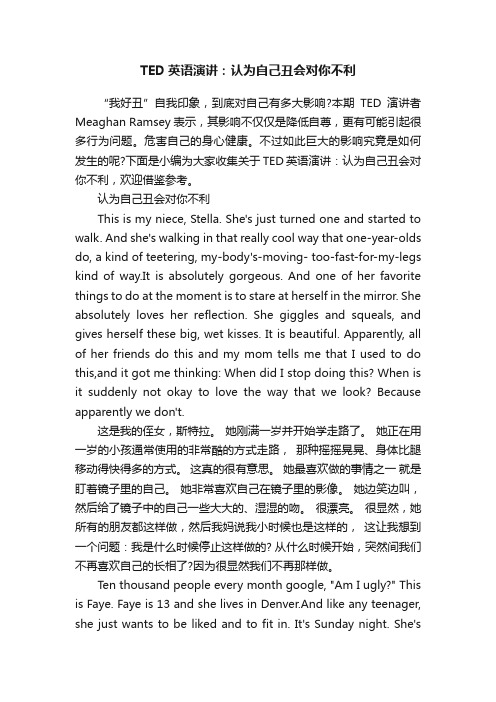
TED英语演讲:认为自己丑会对你不利“我好丑”自我印象,到底对自己有多大影响?本期TED演讲者Meaghan Ramsey表示,其影响不仅仅是降低自尊,更有可能引起很多行为问题。
危害自己的身心健康。
不过如此巨大的影响究竟是如何发生的呢?下面是小编为大家收集关于TED英语演讲:认为自己丑会对你不利,欢迎借鉴参考。
认为自己丑会对你不利This is my niece, Stella. She's just turned one and started to walk. And she's walking in that really cool way that one-year-olds do, a kind of teetering, my-body's-moving- too-fast-for-my-legs kind of way.It is absolutely gorgeous. And one of her favorite things to do at the moment is to stare at herself in the mirror. She absolutely loves her reflection. She giggles and squeals, and gives herself these big, wet kisses. It is beautiful. Apparently, all of her friends do this and my mom tells me that I used to do this,and it got me thinking: When did I stop doing this? When is it suddenly not okay to love the way that we look? Because apparently we don't.这是我的侄女,斯特拉。
Why thinking you're ugly is bad for you
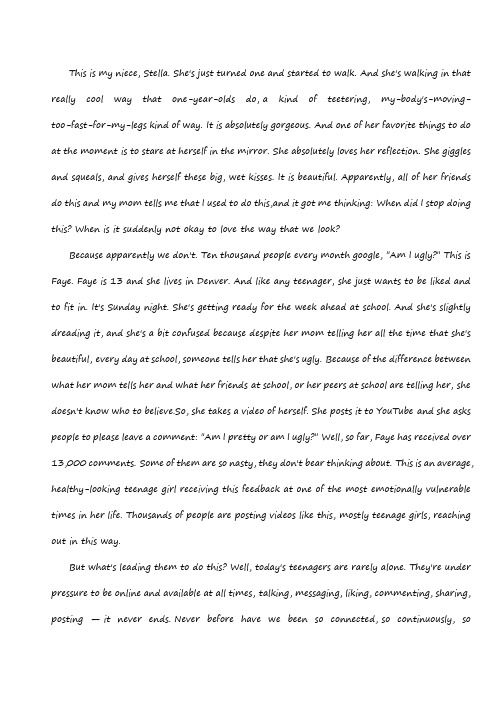
This is my niece, Stella. She's just turned one and started to walk. And she's walking in that really cool way that one-year-olds do, a kind of teetering, my-body's-moving- too-fast-for-my-legs kind of way. It is absolutely gorgeous. And one of her favorite things to do at the moment is to stare at herself in the mirror. She absolutely loves her reflection. She giggles and squeals, and gives herself these big, wet kisses. It is beautiful. Apparently, all of her friends do this and my mom tells me that I used to do this,and it got me thinking: When did I stop doing this? When is it suddenly not okay to love the way that we look?Because apparently we don't. Ten thousand people every month google, "Am I ugly?" This is Faye. Faye is 13 and she lives in Denver. And like any teenager, she just wants to be liked and to fit in. It's Sunday night. She's getting ready for the week ahead at school. And she's slightly dreading it, and she's a bit confused because despite her mom telling her all the time that she's beautiful, every day at school, someone tells her that she's ugly. Because of the difference between what her mom tells her and what her friends at school, or her peers at school are telling her, she doesn't know who to believe.So, she takes a video of herself. She posts it to YouTube and she asks people to please leave a comment: "Am I pretty or am I ugly?" Well, so far, Faye has received over 13,000 comments. Some of them are so nasty, they don't bear thinking about. This is an average, healthy-looking teenage girl receiving this feedback at one of the most emotionally vulnerable times in her life. Thousands of people are posting videos like this, mostly teenage girls, reaching out in this way.But what's leading them to do this? Well, today's teenagers are rarely alone. They're under pressure to be online and available at all times, talking, messaging, liking, commenting, sharing, posting — it never ends. Never before have we been so connected, so continuously, so instantaneously, so young. And as one mom told me, it's like there's a party in their bedroom every night. There's simply no privacy. And the social pressures that go along with that are relentless. This always-on environment is training our kids to value themselves based on the number of likes they get and the types of comments that they receive. There's no separation between online and offline life. What's real or what isn't is really hard to tell the difference between. And it's also really hard to tell the difference between what's authentic and what's digitally manipulated.What's a highlight in someone's life versus what's normal in the context of everyday. And where are they looking to for inspiration? Well, you can see the kinds of images that are covering the newsfeedsof girls today. Size zero models still dominate our catwalks. Airbrushing is now routine. And trends like #thinspiration, #thighgap, #bikinibridge and #proana. For those who don't know, #proana means pro-anorexia. These trends are teamed with the stereotyping and flagrant objectification of women in today's popular culture. It is not hard to see what girls are benchmarking themselves against. But boys are not immune to this either. Aspiring to the chiseled jaw lines and ripped six packs of superhero-like sports starsand playboy music artsits. But, what's the problem with all of this? Well, surely we want our kids to grow up as healthy, well balanced individuals. But in an image-obsessed culture, we are training our kids to spend more time and mental effort on their appearance at the expense of all of the other aspects of their identities. So, things like their relationships, the development of their physical abilities,and their studies and so on begin to suffer. Six out of 10 girls are now choosing not to do something because they don't think they look good enough. These are not trivial activities. These are fundamental activities to their development as humans and as contributors to society and to the workforce. Thirty-one percent, nearly one in three teenagers, are withdrawing from classroom debate. They're failing to engage in classroom debate because they don't want to draw attention to the way that they look. One in five are not showing up to class at all on days when they don't feel good about it. And when it comes to exams, if you don't think you look good enough, specifically if you don't think you are thin enough,you will score a lower grade point average than your peers who are not concerned with this. And this is consistent across Finland, the U.S. and China, and is true regardless of how much you actually weigh.So to be super clear, we're talking about the way you think you look, not how you actually look.Low body confidence is undermining academic achievement. But it's also damaging health. Teenagers with low body confidence do less physical activity, eat less fruits and vegetables, partake in more unhealthy weight control practices that can lead to eating disorders. They have lower self-esteem.They're more easily influenced by people around them and they're at greater risk of depression. And we think it's for all of these reasons that they take more risks with things like alcohol and drug use;crash dieting; cosmetic surgery; unprotected, earlier sex; and self-harm. The pursuit of the perfect body is putting pressure on our healthcare systems6:35and costing our governments billions of dollars every year. And we don't grow out of it. Women who think they're overweight — again, regardless of whether they are or are not — have higher rates of absenteeism. Seventeen percent of women would not show up to a job interview ona day when they weren't feeling confident about the way that they look. Have a think about what this is doing to our economy. If we could overcome this, what that opportunity looks like. Unlocking this potential is in the interest 7:12of every single one of us. But how do we do that? Well, talking, on its own, only gets you so far. It's not enough by itself. If you actually want to make a difference, you have to do something. And we've learned there are three key ways: The first is we have to educate for body confidence. We have to help our teenagers develop strategies to overcome image-related pressures and build their self-esteem.Now, the good news is that there are many programs out there available to do this. The bad news is that most of them don't work. I was shocked to learn that many well-meaning programs are inadvertently actually making the situation worse. So we need to make damn sure that the programs that our kids are receiving are not only having a positive impact,but having a lasting impact as well. And the research shows that the best programs address six key areas: The first is the influence of family, friends and relationships. The second is media and celebrity culture, then how to handle teasing and bullying, the way we compete and compare with one anotherbased on looks, talking about appearance —some people call this "body talk" or "fat talk" — and finally, the foundations of respecting and looking after yourself. These six things are crucial starting points for anyone serious about delivering body-confidence education that works. An education is critical, but tackling this problem is going to require each and everyone of us to step up and be better role models for the women and girls in our own lives. Challenging the status quo of how women are seen and talked about in our own circles. It is not okay that we judge the contribution of our politicians by their haircuts or the size of their breasts, or to infer that the determination or the successof an Olympian is down to her not being a looker. We need to start judging people by what they do,not what they look like. We can all start by taking responsibility for the types of pictures and comments that we post on our own social networks. We can compliment people based on their effort and their actions and not on their appearance. And let me ask you, when was the last time that you kissed a mirror?Ultimately, we need to work together as communities, as governments and as businesses to really change this culture of ours so that our kids grow up valuing their whole selves, valuing individuality, diversity, inclusion. We need to put the people that are making a real difference on our pedestals, making a difference in the real world. Giving them the airtime, because only then will we create a different world. A world where our kids are free to become the best versions of themselves, where the way they think they look never holds them back from being who they are or achieving what they want in life. Think about what this might mean for someone in your life. Who have you got in mind? Is it your wife? Your sister? Your daughter? Your niece? Your friend? It could just be the woman a couple of seats away from you today. What would it mean for her if she were freed from that voice of her inner critic, nagging her to have longer legs, thinner thighs, smaller stomach,shorter feet? What could it mean for her if we overcame this and unlocked her potential in that way? Right now, our culture's obsession with image is holding us all back. But let's show our kids the truth. Let's show them that the way you look is just one part of your identity and that the truth is we love them for who they are and what they do and how they make us feel. Let's build self-esteem into our school curriculums. Let's each and every one of us change the way we talk and comapre ourselves to other people. And let'swork together as communities, from grassroots to governments, so that the happy little one-year-olds of today become the confidentchangemakers of tomorrow. Let's do this.。
TED英语演讲:情商高的人怎样说话
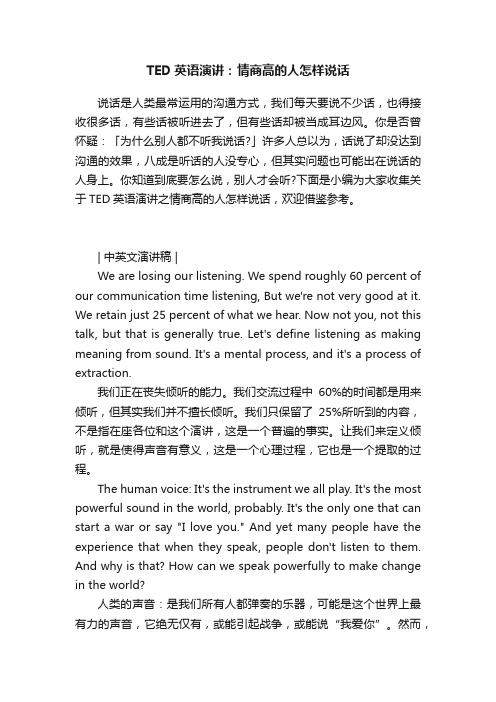
TED英语演讲:情商高的人怎样说话说话是人类最常运用的沟通方式,我们每天要说不少话,也得接收很多话,有些话被听进去了,但有些话却被当成耳边风。
你是否曾怀疑:「为什么别人都不听我说话?」许多人总以为,话说了却没达到沟通的效果,八成是听话的人没专心,但其实问题也可能出在说话的人身上。
你知道到底要怎么说,别人才会听?下面是小编为大家收集关于TED英语演讲之情商高的人怎样说话,欢迎借鉴参考。
| 中英文演讲稿 |We are losing our listening. We spend roughly 60 percent of our communication time listening, But we're not very good at it. We retain just 25 percent of what we hear. Now not you, not this talk, but that is generally true. Let's define listening as making meaning from sound. It's a mental process, and it's a process of extraction.我们正在丧失倾听的能力。
我们交流过程中60%的时间都是用来倾听,但其实我们并不擅长倾听。
我们只保留了25%所听到的内容,不是指在座各位和这个演讲,这是一个普遍的事实。
让我们来定义倾听,就是使得声音有意义,这是一个心理过程,它也是一个提取的过程。
The human voice: It's the instrument we all play. It's the most powerful sound in the world, probably. It's the only one that can start a war or say "I love you." And yet many people have the experience that when they speak, people don't listen to them. And why is that? How can we speak powerfully to make change in the world?人类的声音:是我们所有人都弹奏的乐器,可能是这个世界上最有力的声音,它绝无仅有,或能引起战争,或能说“我爱你”。
ted演讲稿英文版
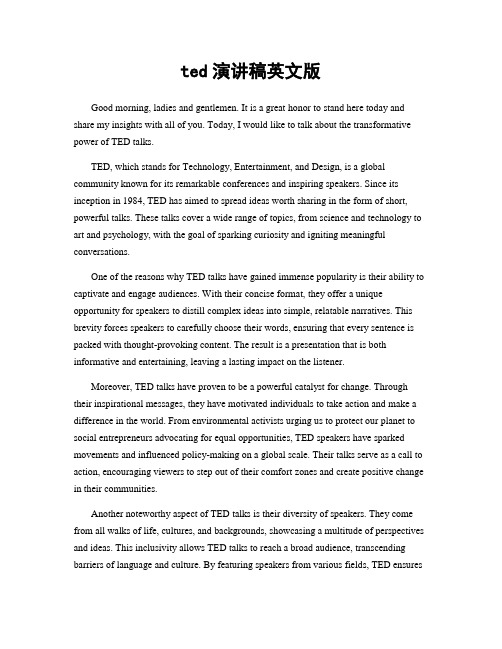
ted演讲稿英文版Good morning, ladies and gentlemen. It is a great honor to stand here today and share my insights with all of you. Today, I would like to talk about the transformative power of TED talks.TED, which stands for Technology, Entertainment, and Design, is a global community known for its remarkable conferences and inspiring speakers. Since its inception in 1984, TED has aimed to spread ideas worth sharing in the form of short, powerful talks. These talks cover a wide range of topics, from science and technology to art and psychology, with the goal of sparking curiosity and igniting meaningful conversations.One of the reasons why TED talks have gained immense popularity is their ability to captivate and engage audiences. With their concise format, they offer a unique opportunity for speakers to distill complex ideas into simple, relatable narratives. This brevity forces speakers to carefully choose their words, ensuring that every sentence is packed with thought-provoking content. The result is a presentation that is both informative and entertaining, leaving a lasting impact on the listener.Moreover, TED talks have proven to be a powerful catalyst for change. Through their inspirational messages, they have motivated individuals to take action and make a difference in the world. From environmental activists urging us to protect our planet to social entrepreneurs advocating for equal opportunities, TED speakers have sparked movements and influenced policy-making on a global scale. Their talks serve as a call to action, encouraging viewers to step out of their comfort zones and create positive change in their communities.Another noteworthy aspect of TED talks is their diversity of speakers. They come from all walks of life, cultures, and backgrounds, showcasing a multitude of perspectives and ideas. This inclusivity allows TED talks to reach a broad audience, transcending barriers of language and culture. By featuring speakers from various fields, TED ensuresthe dissemination of knowledge in a holistic manner, fostering interdisciplinary learning and encouraging innovative thinking.Furthermore, TED talks serve as a platform for intellectual discourse and debate. They encourage critical thinking and challenge preconceived notions, presenting ideas that sometimes go against the mainstream. This environment of open-mindedness enables the exchange of ideas and encourages individuals to broaden their horizons. It promotes understanding, empathy, and tolerance, fostering a society that values diverse opinions and seeks common ground.In conclusion, TED talks have revolutionized the way we consume knowledge and information. These powerful speeches have the capacity to educate, inspire, and mobilize individuals towards positive change. Through their concise format, diverse speakers, and thought-provoking content, TED talks have become a beacon of inspiration and a catalyst for transformative action. Let us embrace the power of TED talks and continue to spread ideas worth sharing. Thank you.。
当别人说我不好ted演讲
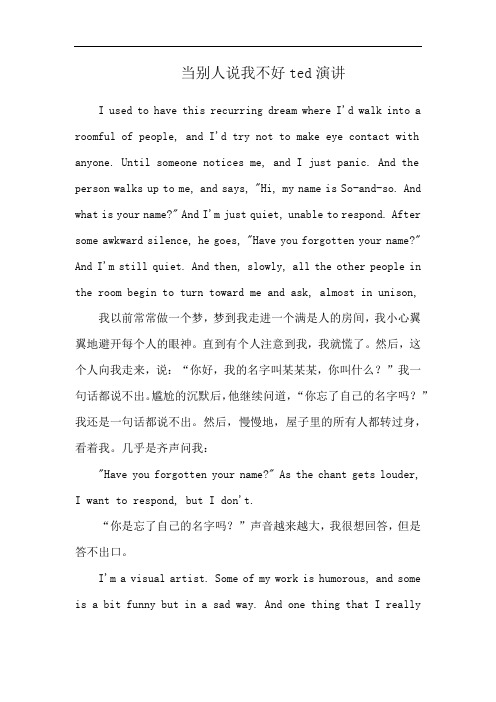
当别人说我不好ted演讲I used to have this recurring dream where I'd walk into a roomful of people, and I'd try not to make eye contact with anyone. Until someone notices me, and I just panic. And the person walks up to me, and says, "Hi, my name is So-and-so. And what is your name?" And I'm just quiet, unable to respond. After some awkward silence, he goes, "Have you forgotten your name?" And I'm still quiet. And then, slowly, all the other people in the room begin to turn toward me and ask, almost in unison, 我以前常常做一个梦,梦到我走进一个满是人的房间,我小心翼翼地避开每个人的眼神。
直到有个人注意到我,我就慌了。
然后,这个人向我走来,说:“你好,我的名字叫某某某,你叫什么?”我一句话都说不出。
尴尬的沉默后,他继续问道,“你忘了自己的名字吗?”我还是一句话都说不出。
然后,慢慢地,屋子里的所有人都转过身,看着我。
几乎是齐声问我:"Have you forgotten your name?" As the chant gets louder, I want to respond, but I don't.“你是忘了自己的名字吗?”声音越来越大,我很想回答,但是答不出口。
- 1、下载文档前请自行甄别文档内容的完整性,平台不提供额外的编辑、内容补充、找答案等附加服务。
- 2、"仅部分预览"的文档,不可在线预览部分如存在完整性等问题,可反馈申请退款(可完整预览的文档不适用该条件!)。
- 3、如文档侵犯您的权益,请联系客服反馈,我们会尽快为您处理(人工客服工作时间:9:00-18:30)。
healthy-looking teenage girl receiving this feedback at one of the most emotionally vulnerable times in her life. Thousands of people are posting videos like this, mostly teenage girls, reaching out in this way. But what's leading them to do this?
2:19 Well, today's teenagers are rarely alone. They're under pressure to be online and available at all times, talking, messaging, liking, commenting, sharing, posting — it never ends. Never before have we been so connected, so continuously, so instantaneously, so young. And as one mom told me, it's like there's a party in their bedroom every night. There's simply no privacy. And the social pressures that go along with that are relentless. This always-on environment is training our kids to value themselves based on the number of likes they get and the types of comments that they receive. There's no separation between online and offline life. What's real or what isn't
specifically if you don't think you are thin enough, you will score a lower grade point average than your peers who are not concerned with this. And this is consistent across Finland, the U.S. and China, and is true regardless of how much you actually weigh. So to be super clear, we're talking about the way you think you look, not how you actually look. Low body confidence is undermining academic achievement.
[ted演讲 004] why thinking yous is my niece, Stella. She's just turned one and started to walk. And she's walking in that really cool way that one-year-olds do, a kind of teetering, my-body's-moving- too-fast-for-my-legs kind of way. It is absolutely gorgeous. And one of her favorite things to do at the moment is to stare at herself in the mirror. She absolutely loves her reflection. She giggles and squeals, and gives herself these big, wet kisses. It is beautiful. Apparently, all of her friends do this and my mom tells me that I used to do this, and it got me thinking: When did I stop doing this? When is it suddenly not okay to love the way that we look? Because apparently we don't.
1:02 Ten thousand people every month google, "Am I ugly?
"This is Faye. Faye is 13 and she lives in Denver. And like any teenager, she just wants to be liked and to fit in. It's Sunday night. She's getting ready for the week ahead at school. And she's slightly dreading it, and she's a bit confused because despite her mom telling her all the time that she's beautiful, every day at school, someone tells her that she's ugly. Because of the difference between what her mom tells her and what her friends at school, or her peers at school are telling her, she doesn't know who to believe. So, she takes a video of herself. She posts it to YouTube and she asks people to please leave a comment: "Am I pretty or am I ugly?" Well, so far, Faye has received over 13,000 comments. Some of them are so nasty, they don't bear thinking about. This is an average,
4:12 But, what's the problem with all of this?
Well, surely we want our kids to grow up as healthy, well balanced individuals. But in an image-obsessed culture, we are training our kids to spend more time and mental effort on their appearance at the expense of all of the other aspects of their identities. So, things like their relationships, the development of their physical abilities, and their studies and so on begin to suffer. Six out of 10 girls are now choosing not to do something because they don't think they look good enough. These are not trivial activities. These are fundamental activities to their development as humans and as contributors to society and to the workforce. Thirty-one percent, nearly one in three teenagers, are withdrawing from classroom debate. They're failing to engage in classroom debate because they don't want to draw attention to the way that they look. One in five are not showing up to class at all on days when they don't feel good about it. And when it comes to exams, if you don't think you look good enough,
